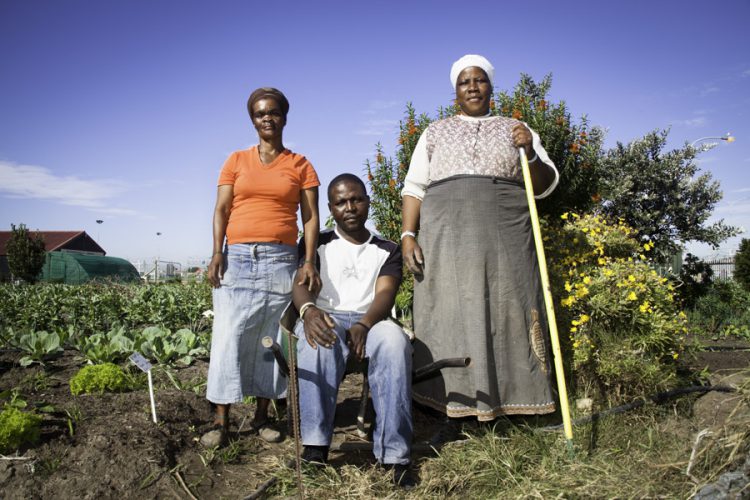Sibongile Sityebi heads up an urban agricultural masterpiece, supported by Ntombesine and Vuyokazi Wulana, two demure but hard working women from the area. When Sibongile, first arrived in Cape Town from the Eastern Cape in 2008, he discovered a garden while exploring his new home. Unemployed at the time, he approached the garden’s owner, Gertrude Cuba, offering to help by clearing out grass. That led on to laying pipes, amongst other tasks, and the more time he spent the more he learned about cultivation. His commitment soon earned him an invitation to join the small team of growers, who, with the help of the Department of Agriculture, continued developing the garden.
At first the garden’s main market was the local community. But the competition was stiff, as the cost of their organic produce couldn’t rival the street hawkers who were selling at a cheaper rate. “In 2010 we met Abalimi Bezekhaya, and suddenly we had a market that could support us, through the Harvest of Hope organic vegetable boxes,” Sibongile says, picking at a blade of grass. He points at a stack of yellow crates. “Now we harvest a number of crates a week, which earns us much more than we were making before.”

Abalimi Bezekhaya (meaning farmers of the home), is a non-profit micro-farming organisation that aims to provide basic human necessities by assisting impoverished groups and communities within the area of Greater Cape Town known as the Cape Flats to establish and maintain their own vegetable gardens. They enable those groups and communities to supplement their existing, inadequate supply of food and create livelihoods. Abalimi Bezekhaya promotes small scale urban farming. They are a development organization rather than charity, because they partner with active members of the community to aid their efforts in greening, growing and bettering their communities.
Abalimi Bezekhaya provide training, supplies and support to enable the urban poor to obtain employment or become self-employed as gardeners, gardening assistants and urban micro-farmers. Our garden centers are based in local communities like Khayelitsha and Nyanga, and they provide low-cost, subsidised resources such as seedlings, manure, tools and pest control, and act as demonstration gardens used for training purposes.
These centres are run by fieldworkers from the community, thus making them accessible and affordable to our target ‘grassroots’ communities. Fieldworkers provide ongoing support to the numerous home gardens and community gardens based at schools, clinics and on municipal land. The Harvest of Hope program helps maintain stable income security for these urban farmers.
Harvest of Hope was established as a community-supported agriculture system (CSA) that connects the Abalimi farmers and potential consumers. The aim was to create a social business that should support the sustainability of the community gardens in the Cape Flats area into the future. The concept was to sell vegetables in a very direct, friendly and personal way so that farmers would benefit from a secure and fair income while customers would benefit from reasonably priced and locally produced fresh organic vegetables. Customers would also have the knowledge that their money is giving people jobs and conserving the environment through local organic farming among the poor.
This story was initially published by food with a story blog http://www.foodwithastory.co.za/Blog/941/Grown-in-Philippi—Sibongile-Sityebi. For more information about the harvest of hope program visit http://www.abalimiharvestofhope.org.za/ or visit their facebook page https://www.facebook.com/abalimi.harvestofhope/photos/sibongile-at-asande-food-garden-with-some-of-the-broad-beans-he-has-grown/1834925266589387/

